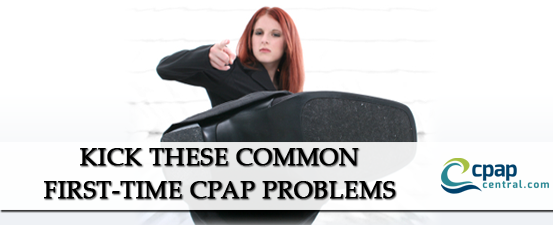Sleep does not always come easy especially for some people with obstructive sleep apnea. CPAP therapy can help you achieve a full night’s sleep; however starting sleep apnea therapy is not always easy.
Last week we discussed the top two first-time problems for CPAP users and options you can take to help correct those problems. This week, we will cover two more common CPAP problems. Whatever your struggles with your CPAP or bi-level equipment, CPAPCentral.com encourages you not to give up on CPAP therapy. If you feel you have tried everything without results, talk with your doctor for further guidance.
First-Time CPAP Problem #3: Struggling with Forced Air
Is the CPAP air pressure keeping you up at night? Adjusting to higher CPAP air pressure can be difficult. Some CPAP machines have a “ramp” feature that could help. This feature allows your therapy to start with a lower air pressure and slowly increases to your prescribed pressure setting. The gradual increase can help you fall asleep.
If this does not help, talk to your doctor. An auto CPAP which automatically adjusts air pressure while you sleep may be recommended. A bi-level machine which supplies two pressure settings, a higher pressure while inhaling and a lower pressure when exhaling, may also be a more appropriate therapy. Your doctor will help you decide the best device for your sleep apnea therapy needs.
Fist-Time CPAP Problem #4: Dry, Irritated, or Stuffy Nose
Using CPAP equipment can cause your nose and throat to feel dry and irritated. Your nose can also feel stuffy. A heated humidifier can help add moisture to your therapy and relieve your stuffy, dry or irritated nose and throat. Check with your CPAP supplier to see if your sleep apnea therapy device supports a heated humidifier.
Sleep apnea therapy has numerous health benefits and can positively influence your quality of life; however persistence is the key to positive results. CPAPCentral.com wants to help you with your sleep apnea therapy whether you are struggling or need replacement supplies. If you have any sleep apnea therapy questions or product questions, contact CPAPCentral.com today.



